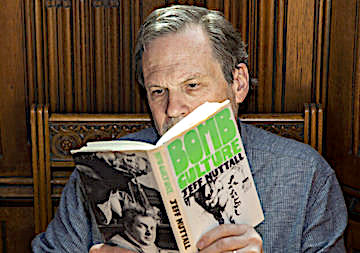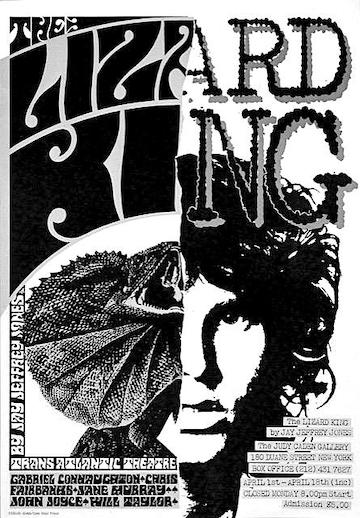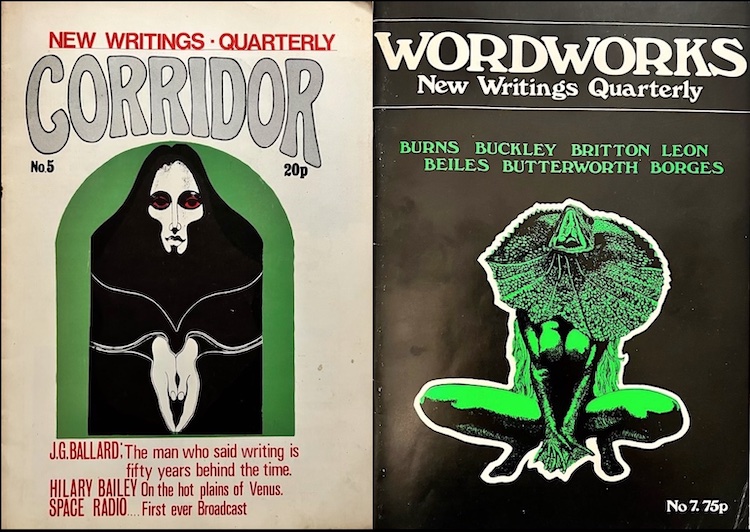By Douglas Field
Crossposted from IT: International Times, The Magazine of Resistance
Jay Jeff Jones was born in in Albuquerque, New Mexico, in 1946. His parents, Nelson and Lila Fay Jones, both hailed from Cherokee ancestry. Raised in and around San Francisco, Jay joined the Hell’s Angels in the early 1960, riding his Harley Davidson around the city. As a teenager, he hung around North Beach, acting with the Mime Troupe, later working as a copy boy for the San Francisco Examiner. Frank Herbert, author of Dune, was one of his bosses.

which he co-edited.
Jay headed for London in 1966, where, as he recalled, he “did the starving writer routine.” He published short stories in Transatlantic Review, where he struck up a friendship with Heathcote Williams, and also wrote for alternative and underground magazines, among them International Times, Cozmic Comix, and Running Man. With Fran, a ballet dancer whom he married in 1968, he headed to British Columbia the following year, a move precipitated by his refusal to fight in the Vietnam War. Returning to the UK in late 1969, Jay lived in Manchester, Heptonstall (West Yorkshire,) and Dartmouth. In 2014, he and Fran returned to Heptonstall, their final home.
Jay earned a living as an advertising copyeditor, a job at which he excelled, but his passion lay in the arts, with a particular interest in the transatlantic underground scene. In the early 1970s while living in Manchester, he struck up a lifelong friendship with the author and publisher Michael Butterworth, editor of Corridor magazine. Jay became the magazine’s publicity director and book reviewer, also contributing a column under the by-line Ace Space. When Corridor was relaunched as Wordworks in 1975 [see postscript below], he became the journal’s Associate Editor. He reviewed books, including William Burroughs’s The Wild Boys and John Fowles’s The Ebony Tower. He also contributed poetry, including “Howl, Now,” which was also published in International Times(March 1977). With Butterworth, he wrote Punk Planet, a space-rock novel that baffled publishers, eluding publication—but they had more success with the short story, “The Harme Oates Effect,” a tale about space junk that was published in Science Fiction Monthly (1975).

“The Lizard King,” was performed
to critical acclaim in New York,
London, Los Angeles,
and Milwaukee.
In 1977, Jay was editor of New Yorkshire Writing, a quarterly magazine with a circulation of around 45, 000. The magazine nearly folded when Jeff Nuttall’s short story, “Dream Piece” was published in issue 6 after it offended the Rotherham Town Councillor, who took umbrage with the sexual content of the story, demanding that the arts funding should be rescinded. Encouraged by Williams to develop an underground comix strip about The Doors front man, Jay wrote a play, The Lizard King, about the last thirty-six hours of Jim Morrison’s life. Performed in New York, London, Los Angeles, and Milwaukee from 1981, The Lizard King was an original and critically acclaimed take on the singer’s last days in Paris.
In 2016, I co-curated an exhibition about Jeff Nuttall with Jay in Manchester, which drew in one hundred and twenty-five thousand visitors. This was the first of half a dozen collaborations, including a smaller exhibition of Nuttall’s work in Flat Time House, London. Other projects including co-editing a volume of Nuttall’s out-of-print novellas and co-editing a fiftieth anniversary edition of Bomb Culture. Quietly erudite, and with an encyclopaedic knowledge of the counterculture and avant-garde, he was also an accomplished poet and essayist. As Butterworth put it recently, Jay “was a major figure who was beginning to consolidate his work and achieve wider recognition when his life was so tragically cut short.” During the last few years, Jay published several poems in International Times accompanied by Martin Sudden’s arresting illustrations. Jay’s recent projects include a short book, The Wind Pours by like Destiny: Sylvia Plath, Asa Benveniste, and the Poetic Afterlife and the poems, Silenian Odes for Cold Turkey Press. One of those poems, “Passion,” ends as follows:
As the old sun began
to swallow itself
and bog mist cloak the wires
they gathered their mess
and headed back down
into a previous future
and the valley’s
unbearable lights.
Jay Jeff Jones, February 18th,1946-May 21st, 2023 is survived by his wife, Fran, and their son, Wesley.
° ° ° ° °
Previous Straight Up blogposts about Jay Jeff Jones.
Postscript: July 16 — Thanks to my staff of thousands, here are sample covers of Corridor and Wordworks.— JH


Your obit about Jay, Jan ,which was posted in May, did a great job. I am grateful to Michael Butterworth for much of the detail about Jay during the 1970s-1990s.
I miss bumping into Jay around Hebden Bridge, West Yorkshire. My kids all loved him and he even brought round treats for our Labrador, who was always excited to see him. He was the real deal: sincere, modest, and kind. And even though he knew much about the Beats/ counterculture than I did, he never made me–or others around him–feel as though he had the upper hand. He was a good–and generous–listener; an authentic soul.
thx, doug. wish i could have. bumped into him. his emails were the next best thing along with the occasional fotos he sent me — the cathedral across the lane from his house, the moors nearby, a Hebdon Bridge village lane as it looked in winter. my “obit” was strictly jay’s own words from a thumbnail bio limited to an abbreviated history of his literary career. jay had sent it to gerard bellaart for a Cold Turkey Press folio not long before he left us.